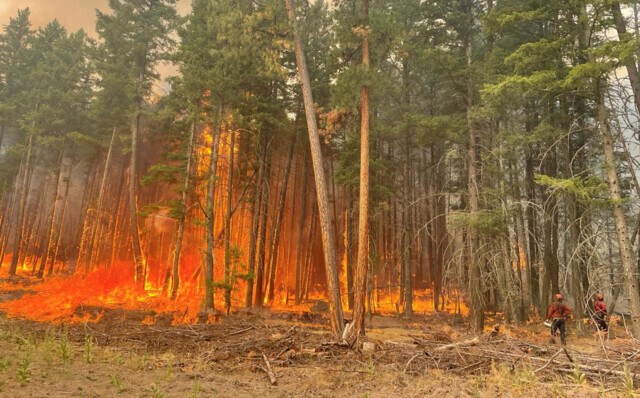Wildfires continue to burn in B.C. Floods ripped through Libya this week, killing thousands. Tropical Storm Hilary poured a year’s worth of rain in a day on some parts of California in August. Those are just a few of the extreme weather events slamming the Earth this year, and the United Nations says we need to get our act together if we don’t want it to get worse.
“With the profound effects of climate change, this year’s unprecedented wildfire season has had a devastating impact on people in British Columbia. Hundreds have lost their homes, tens of thousands were forced to evacuate and two heroic young B.C. firefighters tragically lost their lives,” B.C. Premier David Eby said as he announced the creation of an expert task force to deal with emergencies in the province.
“This has been the worst wildfire season our province has faced and while we are coping with a historic drought, we must be ready for the risk of severe flooding later this year.”
The expert task force will be looking at how to better respond to disasters, but equally important will be determining the cause of those disasters – climate change – in order to prevent them in the future.
Climate change threatens all countries, communities and people around the world, and we’re not doing enough to stop it, the most recent United Nations “Global Stocktake” found.
The report, released earlier this month, is an attempt to take stock of efforts being made around the world to meet the goals of the Paris Agreement to limit global warming to 1.5 degrees Celsius above pre-industrial levels.
The report makes it starkly clear that global emissions are not in line with the goals of the Paris Agreement and there is a “rapidly narrowing window” to make the necessary changes.
“While action is proceeding, much more is needed now on all fronts,” the report says. “Now is the time to rapidly accelerate action and support to make progress in this critical decade.”
Massive transformation of systems in all sectors will be needed to meet the goals, which include reaching net zero emissions by about 2050 and reducing global greenhouse gas emissions by 43 per cent by 2030 and further by 60 per cent by 2035. Emissions must peak between 2020 and 2025, which is basically now. Although emissions have peaked in some developed and developing countries, they’ve not peaked globally, the report says.
Canada’s emissions increased from 2020 to 2021, but 2020 was an outlier low year due to pandemic lockdowns. Over the longer term, Canada’s emissions have been decreasing slightly since 2005, the federal government reports. Overall, Canada creates 1.6 per cent of global greenhouse gas emissions and is the tenth largest emitter and one of the highest per capita emitters, government data shows. The oil and gas sector creates about 28 per cent of all emissions in this country, while the transportation industry is responsible for about 22 per cent, government data shows.
British Columbia’s emissions have remained basically stable since 2005, though they have seen a slight reduction of 3.6 per cent over that time span. Climate resilience and a transition to clean energy sources are required, yesterday.
Rapid change can be disruptive, the report acknowledges. No kidding. This isn’t going to be easy, but we’ve got to act today – decisively and quickly.
The extreme change that’s required could harm more vulnerable people sooner and more extensively than others. For that reason, the UN recommends focusing on inclusion and equity at the same time as reducing emissions.
“Equity should enable greater ambition and increase the likelihood of meeting the goals of the Paris Agreement,” the report says. “Those most affected by climate impacts should be involved in crafting solutions.”
Those solutions have got to be ambitious, creative and decisive. Think of your children’s children’s children and imagine today’s climate chaos magnified on an exponential scale. It isn’t pretty and the time to act is now.
Tracy Sherlock is a freelance journalist who writes about education and social issues. Read her blog or email her [email protected].



